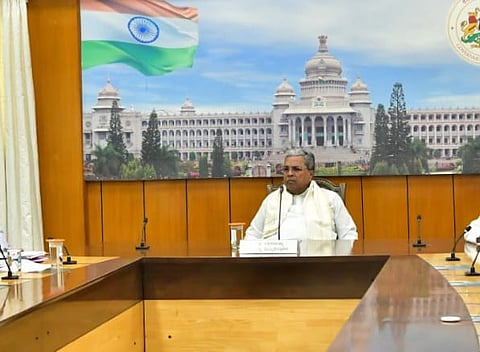

The National Alliance of People’s Movements (NAPM) has written to Congress president Mallikarjun Kharge and senior leader Rahul Gandhi, seeking their intervention to secure justice for 59 nomadic and semi-nomadic communities in Karnataka who have been demanding a dedicated 1% internal reservation within the Scheduled Castes (SC) quota.
In the letter, NAPM said thousands of members of these vulnerable communities, many of whom remain among the most socially and economically marginalized, will march to Jantar Mantar in Delhi on October 2, Gandhi Jayanti, to press for their demands. A delegation also plans to meet Kharge and Gandhi.
The demand follows a nearly month-long agitation at Bengaluru’s Freedom Park, where members of the community sat in protest for several days demanding the implementation of the Justice HN Nagamohan Das Commission, which submitted its report to the Karnataka government in March 2025.
The Commission had classified 101 SC communities into five categories, with some of the most backward communities including nomadic groups such as Dakkaliga, Dombara and Mala Dasari being allocated 1% of the total SC quota.
Although the Karnataka Cabinet accepted the Commission’s report in August, the government categorised the Scheduled Castes into three categories and the nomadic communities were clubbed with ‘touchable’ castes who fare relatively better on social and educational indicators.
NAPM said this implementation has “unfairly merged” nomadic communities with relatively better-off “touchable” SC groups. “This would adversely affect their right to primacy in access to education, government jobs and entitlements, and push them towards further marginalization,” the letter stated.
Communities under the Confederation of Untouchable Nomadic Communities of Karnataka have been at the forefront of the protests. On September 3, they organized a massive ‘Bengaluru Chalo’ rally, backed by the Madiga community, which expressed solidarity by refusing to celebrate its own long-standing demand for recognition until the nomadic groups’ rights are ensured.
The BJP too, has criticised the government’s internal reservation policy and demanded a course correction.
NAPM pointed out that literacy levels among these communities remain abysmally low, and traditional occupations—ranging from folk singing and ritual begging to leatherwork and agricultural labour—continue to keep them at the margins of society. Many are still stigmatized as “untouchables.”
For instance, the Pambada caste of coastal Karnataka has an abysmal literacy rate of 18%. Their caste occupation is drum-beating at religious functions, and they are the hosts for the worship of spirits.
The Bhangi or Zadmali community whose caste occupation is scavenging and the Thoti community whose caste occupation is that of untouchable village servants have literacy rates of 37% and 50% respectively. The Ganti Chores, a denotified tribe, has a literacy rate of about 38% and have traditionally been engaged in agricultural labour.
Other castes which have very low literacy include the Bakuda (29%) who are mainly agricultural workers, Mukri who are dependent on collection of forest products with a literacy rate of 32%, the Ager (28%) who are salt-makers and agricultural labourers; the Kotegarmetri (30%) who were traditionally considered ‘untouchable’ and were engaged in leather work; and the Koosa who are considered bonded agricultural labourers have a literacy rate of 32%.
The NAPM urged the Congress leadership to ensure that the Karnataka government takes immediate steps to “undo historical injustice” and implement the recommendations of the Justice Nagamohan Das Commission.
This includes guaranteeing a dedicated 1% quota for the “most backward” nomadic communities within Category A, and the announcement of a comprehensive policy backed by budgetary allocation for the socio-economic development of all 59 nomadic and semi-nomadic communities, as well as smaller scheduled castes.
“Social justice was the central theme of the Bharat Jodo Yatra and also the new Karnataka government, which came to power after defeating forces opposed to the Constitution. Now is the time to implement this agenda in true letter and spirit,” NAPM said.
The letter was signed by several prominent members of the alliance, including Arundhati Dhuru, Ashish Ranjan, Meera Sanghamitra, Madhuresh Kumar, Sheikh Salauddin and Rosemary Dzuvichu.